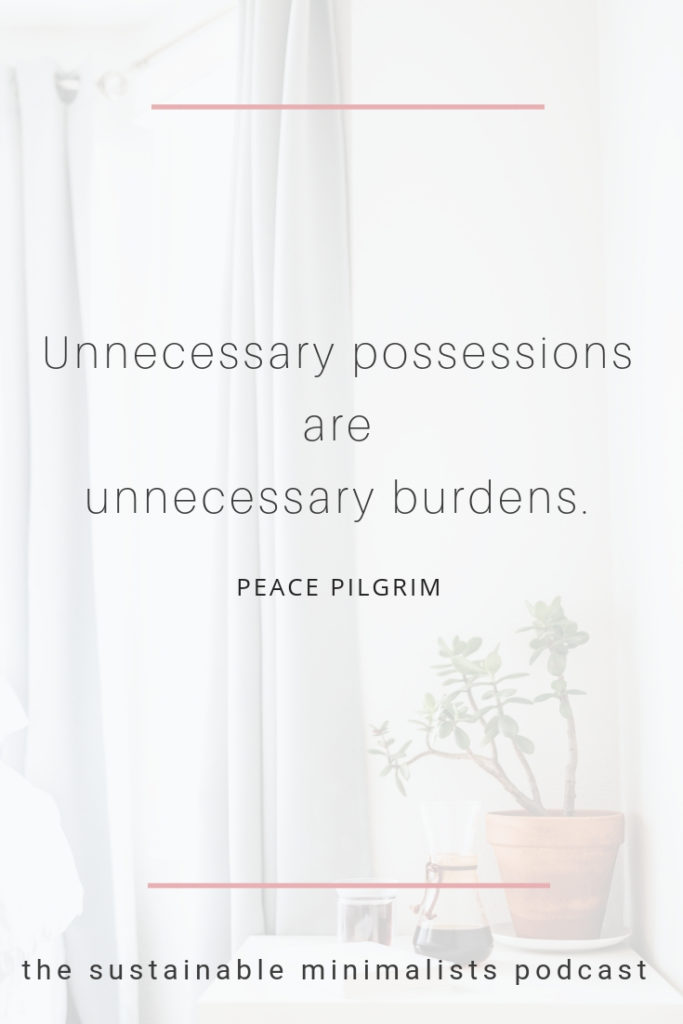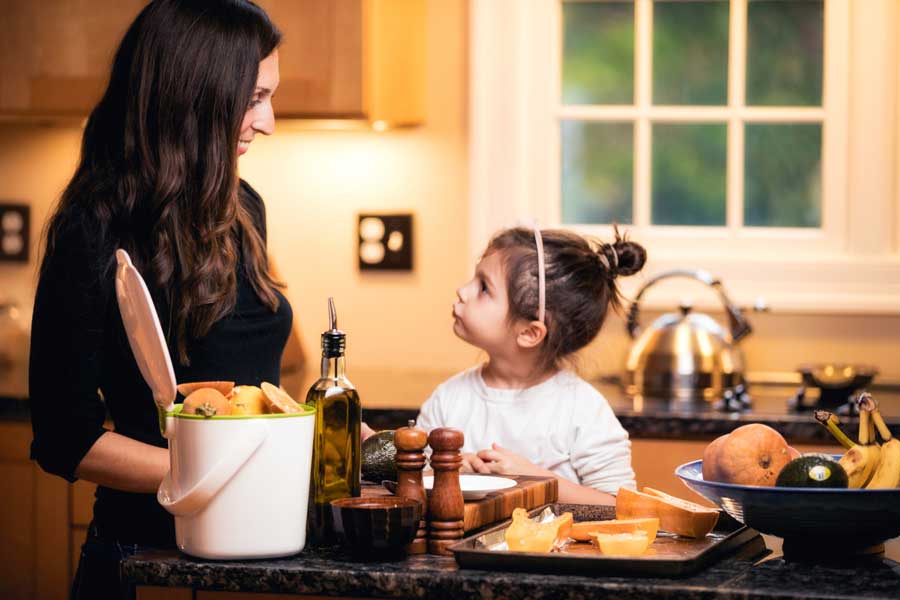How To Be More Eco-Friendly in 25 Steps
How to be more eco-friendly: 25 unconventional (+ free!) ideas
_
Ever find yourself wanting to be more eco-friendly?
Want to do your part but don’t want to spend a lot of money?
In this article I’m offering 25 unconventional ways to live green that don’t require an upfront purchase.
None of the tips cost money; even better, some will save money in the long run.
The eco-friendly lifestyle sometimes gets a bad rap as being reserved only for the privileged, and there’s some truth to that:
– While organic food + hybrid cars are certainly green, they have hefty price tags + therefore aren’t accessible to everyone.
– Some eco-friendly products will save money in the long run, but their significant up-front costs deter consumers from ever purchasing. (A $30 box of disposable diapers is much easier to swallow in the short-term than a $250 set of cloth ones!)
– Finally, there’s a growing market for sustainable goods (Think: silicone bags, beeswax wraps, microfiber-catching washing bags, dryer balls + many more). As a result, it can sometimes feel as though living green requires spending money.
But eco-friendly living isn’t just for the privileged: It’s for you + me, too. Here’s how to get started.
How to be more eco-friendly without spending a cent:
1. Borrow, baby!
_____
Lose your wedding ring? Don’t rush to the store + purchase a metal detector.
Need a leaf blower? Buying a new one is a waste of your money; it’s a waste of precious garage space + Earth’s resources, too.
If you need a tool for a limited about of time, consider borrowing or renting from neighbors in your community.
2. Carpool with pride
_____
Ride sharing decreases the amount of cars on the road, eliminates unnecessary carbon dioxide from entering the atmosphere + saves money. (It saves on driving hassle, too!)
Coworkers don’t live nearby? No problem. Consider using one of countless ride share apps to crowdsource your commute.
3. Clean that lint trap, every single time
_____
Everyone knows that cleaning the dryer’s lint filter prevents fires, but there’s a second, lesser-known benefit, too: A clean filter reduces drying time. Less drying team means less electricity gets wasted.
4. Cook in residual heat
_____
Unless you’re baking (cookies, pies, or something else that really needs to go in a hot oven), know that you can put dinner in an oven that’s preheating.
You can also turn your oven off a few minutes early – but don’t open the door! – and let your dish finish cooking in that very hot oven.
The goal here is to reduce the amount of time that your oven is actually on. By doing so, you’ll save on electricity costs.
5. Embrace cold water
_____
According to The Worldwatch Institute, 85 % of the energy used to machine-wash clothes goes to heating the water. That’s why, when it comes to laundry, it’s prudent to wash in cold water.
Know that clothes + towels happily benefit from cold washing. Bedsheets, however, require warm water (not hot!) to get fully clean.
6. Go plant-based 4% of the time
_____
Eat 3 meals a day? That’s 27 meals a week. It takes 2,500 gallons of water to produce one pound of beef, so eating one vegan meal a week saves serious water.
Follow #meatlessmondays on social media`for inspiration.
7. Grab those bottle refunds
_____
Bottle refund programs reduce litter + ensure return of highly desirable recyclables like glass and aluminum.
So collect those cans + bottles and get a 5-cent refund if you live in one of the 11 participating states (California, Connecticut, Delaware, Hawaii, Iowa, Maine, Massachusetts, Michigan, New York, Oregon + Vermont).
8. Inflate your tires
_____
Buy less gas by keeping your car’s tires properly inflated (full tires result in increased gas mileage).
On newer cars, the recommended tire pressure is most commonly listed on a sticker inside the driver’s door. If there’s no sticker on the door, you can usually find the specs in the owner’s manual.
Most passenger cars recommend tire pressure between 32 psi to 35 psi when cold.
9. Light fires the old-fashioned way
_____
Stop buying plastic lighters! Go back to matches, instead.
Back when smoking was popular matches were given away for free everywhere. Now they’re a little harder to find, but keep your eyes open at convenience stores + gas stations.
10. Make your own cleaning products
_____
Most of us assume our cleaning products are regulated, but they’re not. We assume they’re harmless to our health and to our children’s health, too, but that’s not necessarily the case.
Household cleaning supplies are jam-packed with the most powerful bacteria killers in existence. Unsurprisingly, they aren’t great for the environment due to their toxic effects on animals + plants once they enter our waterways via sewer systems.
Make your own DIY cleansers for the planet, for your family’s health + for your wallet, too. Here are some ways to get you started.
11. Pick up poo
_____
If you think that dog poo is a natural fertilizer, you’re wrong. Cow feces is fertilizer, but there’s a big difference between cows and dogs: their diets. Cows are herbivores. Dogs are carnivores.
Dog feces contain bacteria like E. coli + salmonella; it’s a common carrier of parasites including worms, Parvovirus + more, too.
It’s a common misconception is that if you don’t pick up your dog’s poo, it will quickly break down or wash away. The reality is that, while feces take about a year to decompose, bacteria + parasites stick around for several years MORE.
If you don’t pick it up, dog feces spread pathogens into streams when it rains.
Use old bags you have lying around (bread bags, newspaper bags, reused produce bags) or buy eco-friendly ones if you’re in the market.
12. Pop smart
_____
Love popcorn? Popcorn is my go-to snack, 9 times out of 10.
But what about those bagged microwave popcorn inventions? Have you ever thought about how pointless all that excess packaging is, really? Pointless box. Pointless bag, pointless plastic overwrap.
Worrse, bagged popcorn made for the microwave is lined with harmful chemicals for both humans and the planet.
Pop the old fashioned way over the stove in a pot with oil instead of relying on the “convenience” of microwave popcorn.
13. Put the vampire energy suckers on notice
_____
GoogleTV + AppleTV set boxes, computers, modems + DVD players suck significant energy when they’re “sleeping”. Unplug them + watch your electricity bill drop.
14. Recycle your cell phone
_____
Did you know? since 2007, 7.1 billion smart phones have passed through the hands of humans.
Hold onto that cell phone as long as possible: don’t just willy-nilly upgrade because a new model comes out.
When you do upgrade, try your darnedest to repurpose your old one. Maybe it’s your new flashlight or your desk calculator.
Remember to repurpose, reuse + – only when all else fails! – recycle. Take advantage of cell phone recycling programs to keep your discarded models out of landfills + to prevent toxic battery leaks.
15. Refuse free stuff you don’t need
_____
Free pens. Free tee-shirts. Ketchup packets. If you don’t need it, don’t take it. Save such items for others who actually do need them, instead.
My 5 year old gets tee-shirts for nearly every activity she participates in, but she never wears any of them. These days, we politely decline them + don’t bother taking them home. Because if she doesn’t need them + won’t use them there’s no sense in consuming them.
16. Repair that leaky faucet … and that leaky toilet
_____
A leaky faucet can waste up to 140 gallons of water every week, so check all your faucets as well as the pipes under the sinks regularly.
When it comes to your toilet, know that your toilet may be leaking + you may not know it. To test this, place a single drop of food coloring in the bowl’s water ten observe for 24 hours.
Does the water go back to its clear color? If so, your toilet is silently leaking. Fix it!
17. Repel ticks the eco-friendly way
_____
Live in tick country? Use a topical tick repellent instead of a collar, as collars do not biodegrade.
18. Repurpose wasted water
_____
If it takes awhile for water to heat in your home, put a bucket under the tap + collect the cold water. Then water your indoor plants or outdoor garden.
Washing organic produce at your kitchen sink? Save that water, too, for the same purpose.
19. Scrub smarter
_____
Scrub dirty dishes with the water off; turn the faucet on only at the end.
If you have a dishwasher – + especially if you have an energy-efficient dishwasher – use it proudly. Research has found that dishwashers are better for the planet than hand washing because they use significantly less water. Just make sure you fill it all the way (no more running half-filled dishwashers!)
20. Surf green
_____
Ecosia plants trees with its ad revenue, so use it instead of Google when surfing the web.
Simply make Ecosia your home screen or download the browser extension to browse the eco-friendly way.
Browse often on your phone? Download their free app for when you’re on-the-go, too.
Ecosia has planted over 65 million trees where they’re needed most as of this writing + it’s all completely free for you, the internet surfer.
21. Swap wardrobes
_____
The production + transportation of a single cotton tee-shirt generates several pounds of greenhouse gases. Don’t buy new clothes; instead, swap wardrobes with someone else.
Clothes swaps save money, reduce textile waste + lower swappers’ carbon footprints. Check MeetUp.com to find out if there’s an upcoming swap meet near you.
Of course thrifting is also an option; renting garments for occasions when it just doesn’t make sense to buy new is gaining popularity, too.
22. Turn down the water heater
_____
Most of us rarely – if ever – need tap water at its hottest, so why not turn down the water heater? It’s as easy as turning the knob on the heater.
The standard temperature for most water heaters is 140 degrees Fahrenheit. Try adjusting it to 130 or even 120 degrees + see if you notice a difference.
I can’t live without my hot (+ I mean really hot!) showers. I turned my water heater down to 120 degrees + didn’t notice any difference in my shower quality.
23. Turn off lights
_____
My mother likes to tell the story about how, when I was a kid as young as 5 or 6 I’d follow her around the house in the evening and shut off lights as she walked from room to room. 30 years later, I do the exact same thing.
There’s no sense lighting rooms you aren’t using. If you haven’t switched your lightbulbs over to LEDs yet – if you’re still using incandescent bulbs or Halogen bulbs – know you can actually save a bit of money by simply turning off the lights:
Incandescent bulbs: If you leave 10 incandescent bulbs on for one hour per day when they’re not needed you’re adding an extra $24 to your electric bill every year.
Halogen bulbs: If you have 10 halogen bulbs + you leave them on for just one hour a day when they’re not needed you’re adding $17 to your lighting bill every year.
LED bulbs are the most cost-effective by far: it costs just $1.32 to leave a single bulb on for 1000 hours.
Switch over to LEDs + shut them off when you’re not using them, too.
24. Use the toaster oven
_____
It’s called an oven for a reason + that’s because toaster ovens perform all the essential duties of a, well, oven.
If you need to bake something small, heat up the smaller toaster oven as opposed to heating up the large oven + wasting all that electricity.
25. Wipe with intention
_____
Have a child in diapers? Wipe smarter + kiss eco-guilt goodbye.
Buy biodegradable baby wipes + use them to capacity -buy cutting an entire package in half + using them on all those pees that require just half a wipe, if that.
Pro- tip: Make sure you cut the wipes ahead of time. If you wait, you won’t do it.
Don’t have a kid in diapers? Think about all the single use products you consume en masse:
Napkins at fast food joints: Do you take a stack, or do you take just one or two?
Paper towels in public restrooms: How many do you mindlessly grab? Know that you just need one: First, shake your hands in the air then take just ONE paper towel.
Don’t use more than you need.
I’d love to know: How do you live green without spending extra money? Share your eco-friendly tips in the comments!




4 thoughts on “How To Be More Eco-Friendly in 25 Steps”
Nicely stated. I started the minimalist and eco-friendly journey, almost simultaneously. It’s funny how it starts to become addictive. I don’t really preach to my kids, but they watch. For instance, at home we strictly use metal straws and I’ve begun taking my own coffee cup to Starbucks. A day ago, my 10yo mentioned seeing a YouTube video where some wildlife rescuers removed a straw from a sea turtles nose! He said, I think we should completely quit using plastic straws! Today was crazy and we found ourselves getting Wendy’s for lunch. I brought our drinks to the table and he said, “You forgot the straws” to which I said, “I thought you were worried about the turtles😇” We ended up skipping lids and straws! I’m not sure we really saved a turtle, but it was a little less plastic in the landfill! Yay us!!!!
I love that your son is picking up on your efforts! Now THAT’s the power of small changes here + there. Thanks for sharing. Keep up the great work!
-Stephanie
Using a cup to rinse your teeth after brushing also conserves water that would have been rushing down the drain as you brushed! Low flow shower heads and toilets also conserve water.
Great tips. Thanks for mentioning them!
Comments are closed.